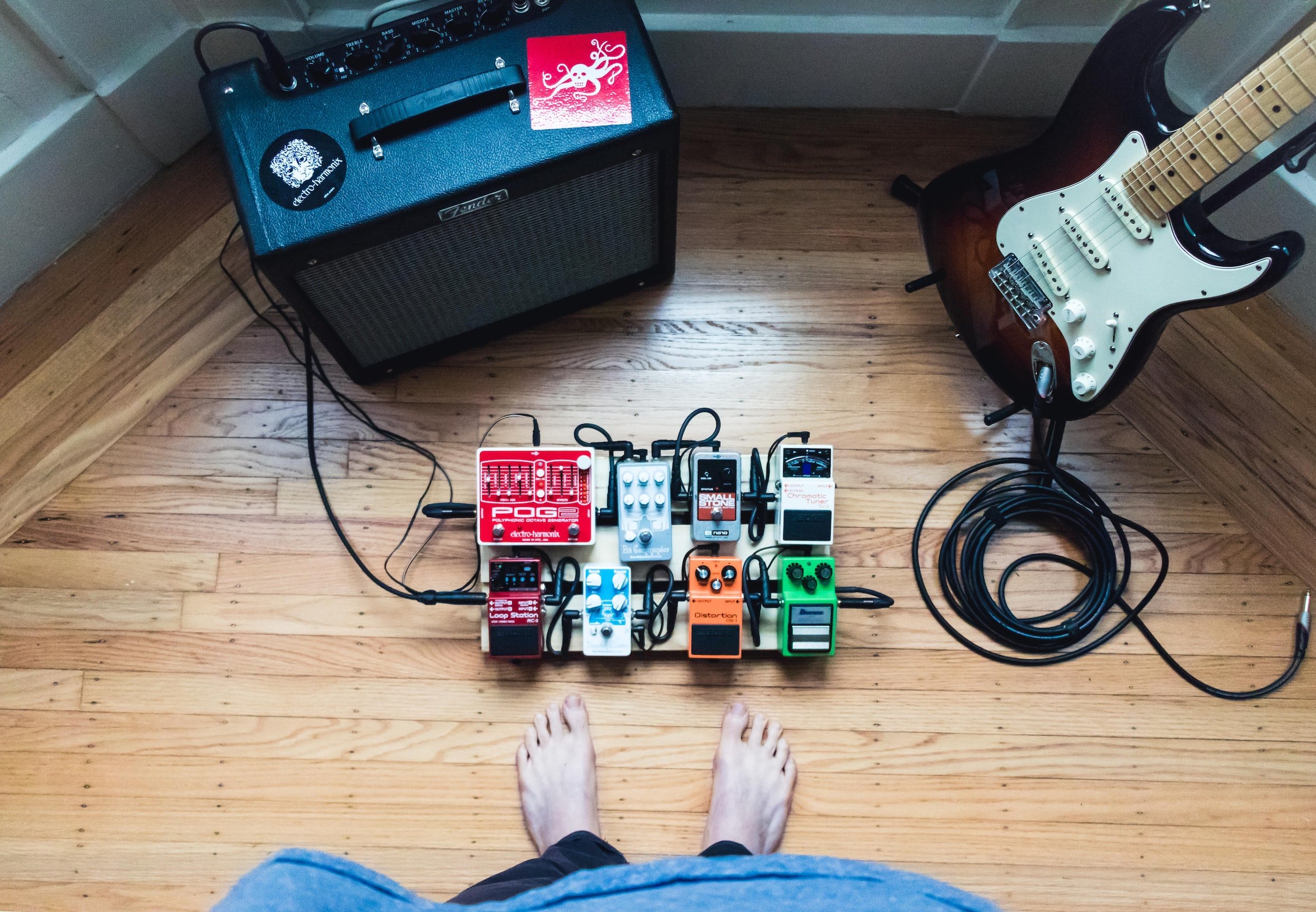Dear Musical Burnout, Goodbye (12 indispensable tips)
Musical burnout happens. It’s inevitable. But that doesn’t mean we can’t have more control over it or prevent it – even fix it. So welcome to my top tips on beating musician burnout.
I’m confident the insights and ideas in this post will help you better manage the symptoms and effects of running yourself into the ground (musically speaking).
So let’s skip the small talk and just dive right in.
Let’s start with a quick definition and some symptoms to know.
What Is Musician Burnout? Definition + Symptoms to Know
What is musician burnout and what are the symptoms?
Understanding what something is and what it looks like is a crucial first step before addressing the thing.
So true, right?
Totally. So let’s start there.
Musical burnout is a state of creative and emotional exhaustion. It can often feel like you haven’t accomplished enough and you’re not sure who you are as a musician.
Here are some signs you may be experiencing musician burnout:
A lack of motivation
Negativity about yourself and others
Fatigue
Apathy towards your music
Physical signs like headaches or sleep issues
Beating Musical Burnout: 12 Tips Every Modern Musician Needs
These tips are based on research and personal experience.
Some may help more than others, but I’d love to hear if you’ve got any more ideas. So let me know in the comments!
As with most tips, it helps to self reflect and know the source of the problem before we can fix it. So that’s where we’ll start.
1. Find the Source(s) and Reduce Exposure
This one is pretty straightforward: do more of what you love (and less of what you don’t).
Of course, it’s important to double down on weaknesses and push through them. But we’re talking about avoiding and overcoming burnout, so let’s leave that discussion for another day.
Knowing the source of your burnout can help you to reduce exposure, create workarounds and limit your burnout severity.
So take note of moments and tasks that make you feel burned out (more so than others).
Keep track and analyze that data.
Keeping a log of your bottlenecks and sources of burnout can be incredibly helpful.
Decide if these are tasks that you can either automate, outsource or get rid of completely. If not, create a workflow to address them (at a healthy pace).
2. Take A Break (Embrace the Break)
Taking breaks is essential. Don’t feel bad about this – in fact, embrace them and love them.
Remember in the intro, I mentioned “fixing” your musical burnout. Well, let’s unpack that.
Rather than trying to fix your feelings of burnout, and getting stressed about it. Just accept your mood and step away.
Reward yourself and treat burnout as moments to enjoy and totally relax.
You’ll come back later with a clearer mind, some fresh energy and a much-needed creative objectivity (which is a great songwriting hack on its own).
Here are some great musical breaks to try:
Go for a walk
Take a shower
Put some headphones on take a train ride (I love this one personally)
Plan a trip
Do some action sports (snowboarding, skiing, surfing, skateboarding, etc.)
Go ice skating
Watch a movie
Take a hike
3. Prioritize Self Care
Self care should always be a top priority. After all, if we don’t feel our best – mentally and physically – then we’re just begging for an eventual burnout.
So step away and ask yourself if you’re taking the best care of yourself. Hustle culture can be cool – sometimes. But damn, take care of yourself too.
Here are some things I prioritize in my self care routine:
Get outside
Exercise
Get good sleep
Eat well
Hang out with friends
Meditate and practice mindfulness and gratitude
4. Write It Out
Journaling. Writing. Scribbling down musings in an app. It’s all cathartic.
And it can be incredibly helpful for overcoming musician burnout.
So if you’re feeling a bit tapped out, journaling may be a great way to write your feelings, find out why you feel a certain way and get out of that temporary slump.
Because remember, it is temporary.
5. Talk It Out
Talking things out can be super helpful.
It can really put things in perspective. Venting is awesome.
I’ve read quotes that go something like complaining is admitting to the other person you’re not in control or complaining doesn’t fix the problem. So let’s nip this in the bud.
First, this is not complaining. You’re not complaining. You’re a human person with emotions and you’re talking out how you feel. Embrace that shit.
Second, talking things out does not mean you have no control. Actually, admitting you’re feeling overwhelmed and talking with someone about it is way more impressive and brave than “powering through”.
So speak with a friend, a family member or even a therapist. It’s a great thing.
6. Try Meditation and A Mindset Shift
It’s cliche, I know, but mindset is everything.
I’ve been a bit obsessed with perspectives and creativity recently. But I’ve seen some of the biggest changes in my own musical process because of it.
Meditation is closely related. It’s a great way to tap into your mindset and make changes.
So here are some tips for practicing a mindset shift away from musical burnout:
Meditate and self reflect
Recognize and challenge any limiting beliefs
Start noticing more positives in life (not negatives)
Stop watching the news
Hang around people with mindsets you’d like to share
Get rid of sunk cost thinking
7. Outsource. Collab. Ask for Help. Build A Music Support Network.
Sometimes burnout can be avoided by simply outsourcing tasks or leveraging outside help.
We can’t always do everything on our own. Eventually, we get burned out.
So for this tip, we should lean on our social support network – or find/create one.
You can do collabs with other musicians, you can hire someone and outsource tasks, ask a friend for help or use social media.
Sometimes burnout is the result of just having too much on your plate.
So pick out your favorite things – your strengths. And maybe outsource the things you’re not thrilled about doing.
8. Get Social – Go Hang Out With Some Friends
We’re social beings. We need our friends and social groups.
So if we eliminate the social sides of life – whether intentionally or not – we can get pretty lonely, and burnout can be expected.
As humans, we need to socialize. There are many benefits, such as more regulated stress and anxiety, better memory and protection from neurodegenerative disease and boosts to both your physical and mental health.
So it’s not the biggest leap to say that socializing will help you reduce or overcome feelings of musical burnout.
(Especially if your network is full of people who inspire you and make you better.)
So go out and catch up with some friends. Or meet some new ones. Get social.
9. Timebox Your ‘ish (Prioritizing A Work-Life Balance)
Timeboxing is a pivotal part of developing an effective workflow.
Essentially, this means scheduling time for deliberate practice, action and improvement. But the key here is to schedule our workflow and daily routine to prioritize a healthy work-life balance.
Some days, it’s easy to be in the zone for hours on end. You’re feeling it and motivation seems like a limitless source.
Then other days, it’s like pulling teeth to get started.
Create a schedule that sits in the middle. Balance and moderation is usually better.
For example, I set aside at least three hours every evening for focused music practice. This includes vocal training and singing, songwriting and music production.
Some days I do go over – and some days are slightly less.
But my average is right around three hours. This works for me since I still need to work during the day. Once I can go more full time with my brand, this workflow will need to be adjusted.
So audit your life, work and lifestyle and timebox a realistic schedule for your music time. Prioritize balance.
10. Remember Your Why
Why are you a musician? What’s your driving motivation?
This can be simple. Like, “it’s fun” is perfectly acceptable. But try to dig a little deeper at what drives you as a musician.
Consider your inspirations and your short-term or long-term goals. Consider your mission and purpose for your brand.
These things can be invaluable sources of motivation when you’re not in the mood to create. They can also be helpful reminders when you’re feeling burned out.
So do some self reflecting on what drives you the most as a musician and get back to a place of pure enjoyment and genuine fun. Burnout can be the result of doing too many tasks you don’t enjoy or things that don’t (seem to) align with your goals or purpose.
So try to tie those menial tasks back to your purpose somehow – or outsource them if they’re irrelevant and simply drain your musical energy.
11. Set Boundaries and Minimize Your Workload
Let’s get straight to it.
Small daily effort over the long term > random marathons of effort all willy nilly.
Here’s some math (inspiration from Matt Gray on Twitter) that sums up this point.
I think most of us understand and accept this truth. But let’s use singing practice as an example.
When I first started my I-need-to-sing-better journey, I had a tendency to only practice when motivated (mistake!). Motivation doesn’t work that way.
So I’d have marathon days where I practiced for hours and consumed all sorts of knowledge with a focused mindset.
Then I’d do nothing for the next three days.
After that, I’d have maybe another marathon day – or maybe just an hour.
Over time, this sporadic workflow resulted in my voice improving only marginally.
However! Once I started dedicating just 30 minutes a day of focused practice (even if I didn’t feel like it), my vocal agility improved immensely.
This concept applies to musical burnout nicely.
We should avoid a schedule that’s purely motivation-based, sporadic and full of max-output days. We’ll get burned out and improvement will be unreliable.
So don’t burn yourself out. Set boundaries (for example, don’t overwork, even if you’re in the zone) and lighten your workload. Slow and steady wins the race.
12. Work On A Different Music Project
Sometimes burnout just has to do with the project at hand – not necessarily the whole music-life process.
So this is a simple quick fix.
Try shifting your attention to something new or more exciting. Let the motivation of a new venture push out the feelings of burnout.
Although yes, it’s definitely important to finish your songs, it’s also important to step away sometimes – especially if you’re feeling burned out.
Sources:
Want More? Check Out These Sweet Reads!





